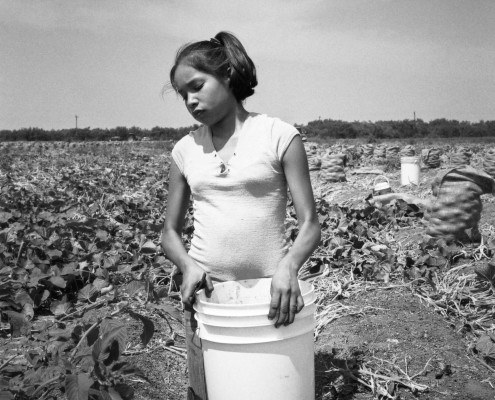A Toxic Decision — How Protecting Child Farmworkers May Be Pushed Aside by the EPA
By Len Morris
America’s fields, orchards and farms are toxic places for children; and things could get much worse thanks to recent actions by the Trump administration Environmental Protection Agency led by Administrator Scott Pruitt, an ideologue willing to put business interests ahead of the health and welfare of migrant families and U.S. citizen children that the EPA. is responsible for protecting.

Len Morris
Over 2 million farm workers work in American agriculture, an estimated half a million of these are children. Their work puts them in daily direct contact with hazardous pesticides that can sicken them, lower their IQ, make them chronically ill or even lead to death.
Two regulations to protect children from pesticide poisoning, illness and death, The Agriculture Worker Protection Standard of 2015 and The Certification of Pesticide Applicators Rule currently of 2017 make it illegal for children under 18 to handle these chemicals, especially those considered most toxic and lethal. These are the protections Pruitt has proposed revising/eliminating.
For children on farms, pesticide exposure is particularly hazardous. The American Academy of Pediatrics has said there is a clear link between childhood exposure to pesticides and pediatric cancers, decreased cognitive functions and behavioral problems. Young children are especially vulnerable as they metabolize poisons faster than adults.
An estimated 1.1 billion pounds of pesticides are applied to crops each year in the U.S. The Environmental Protection Agency has reported 20,000 cases of pesticide poisoning, a low estimate since reporting is spare and migrant families are often afraid to seek medical attention.

Yesenia, age 12, harvesting onions in South Texas (Photo courtesy of Robin Romano)
It’s one thing to streamline regulations to promote economic growth but quite another when the work of an agency has become so corrupted that it turns its back on children’s health. Today’s EPA. under Pruitt’s stewardship has become a shameful enterprise, weakening the health of all Americans by lowering the quality of the air we breathe, the water we drink and the safety of our food supply while compromising the health and safety of those who harvest our food.
Today, more Americans than ever before are purchasing organic and locally grown food in an effort to minimize their children’s exposure to pesticides. Shouldn’t we have the same basic consideration for those children whose families do the work of bringing that food to our table?
The public comment period for the proposed revisions has not opened yet.
This piece was originally published January 17, 2018 on the Media Voices for Children website. Len Morris is the executive director of Media Voices for Children and a film director who has made several documentaries about child labor, including “Stolen Childhoods.”

